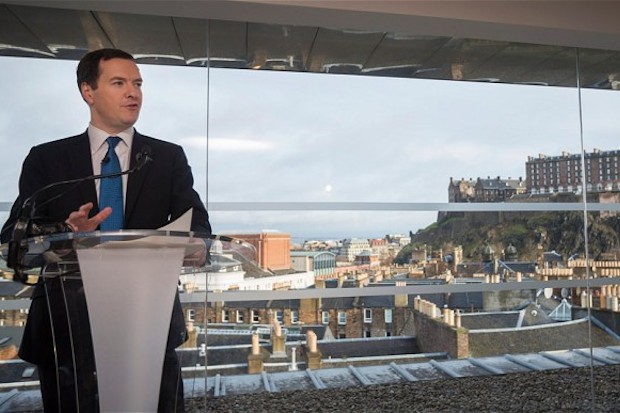‘If Scotland walks away from the UK, it walks away from the pound’, the Chancellor said this morning. In a speech aiming to blow a hole in the SNP’s campaign, George Osborne has set out why sharing the pound isn’t on the cards for an independent Scotland. Here are the key points from his speech, the reactions and why a currency union with the rest of the UK won’t happen
1. The Tories, Lib Dems and Labour have united on a technical fight
It’s very rare that George Osborne, Ed Balls and Danny Alexander can find something to agree on. The fact they’ve publicly united against a currency union with Scotland shows how pressing the matter is.
Following on from a speech by Mark Carney two weeks ago on the perils of any currency union, Osborne has described the ‘gaping chasm at the core’ of the SNP’s plans for an independent Scotland:
‘The evidence shows it wouldn’t work. It would cost jobs and cost money. It wouldn’t provide economic security for Scotland or for the rest of the UK. I don’t think any other Chancellor of the Exchequer would come to a different view’
The Shadow Chancellor Ed Balls agrees it won’t happen:
‘It would be bad for Scotland, it would place an unacceptable burden on the UK taxpayer, it would repeat the mistakes of the euro area. In fact worse, you’d be trying to negotiate a monetary union as Scotland is pulling away from the UK. It won’t happen, I wouldn’t recommend it.’
And for the political hat trick, Chief Secretary to the Treasury Danny Alexander:
‘This isn’t bluff, or bullying, it’s a statement of fact. The SNP’s claims that an independent Scotland could or should be able to share the pound are pure fiction. When we vote in September, no one in Scotland should vote for independence in the belief that we could keep the pound.’
2. Treasury Mandarins don’t think a currency union will work either
The Permanent Secretary to the Treasury Nicholas Macpherson backs up these views. Surprisingly, his private advice to the Chancellor has been publicly released. In a letter to the Chancellor, Macpherson points out currency unions are ‘fraught with difficulty’ and require ‘extraordinary commitment’ from all parties
‘I would advise you against entering into a currency union with an independent Scotland. There is no evidence that adequate proposals or policy changes to enable the formation of a currency union could be devised, agreed and implemented by both governments in the foreseeable future.’
The Treasury has set out four requirements for a currency union: banking union, greater fiscal risk sharing, having the same monetary and exchange rate policy and permanence of any union — all of which are uncertain under the plans for an independent Scotland.
Macpherson sets out three reasons why the union ‘as currently advocated’ won’t work:
‘First, the Scottish Government is still leaving the option open of moving to a different currency option in the longer term. Successful currency unions are based on the near universal belief that they are irreversible
‘…Secondly, Scotland’s banking sector is far too big in relation to its national income, which means that there is a very real risk that the continuing UK would end up bearing most of the liquidity and solvency risk which it creates
‘…Thirdly, there is the problem of asymmetry. The continuing UK would be at risk of providing taxpayer support to the Scottish financial sector and sovereign ‘
Many of the points Macpherson and the Treasury has made against a currency union with Scotland could equally be applied to the Euro.
3. As punishment, the SNP are threatening to default on UK debt
As Macpherson predicted, the SNP’s Nicola Sturgeon has accused Osborne of trying to fool the Scottish people with ‘campaign tactics’. In retribution, she has stated that an independent Scotland wouldn’t take on its share of the UK’s national debt, estimated to be in the region of £120-150 billion:
‘All the debt belongs legally to the Treasury, as they confirmed just last month – we can’t default on debt that’s not legally ours. However, we’ve always said we think Scotland should meet a fair share of the costs of that debt – but assets and liabilities go hand in hand’
4. Reneging on Scotland’s portion of the UK debt isn’t credible
The Permanent Secretary doesn’t think it’s a believable threat because it would hinder an independent Scotland’s economic credibility, the affect on gilt yields is likely to be minimal and any increase in funding costs would still be less than an ill-thought out currency union.
Osborne has likened the threat to saying ‘because my neighbour won’t agree to my unreasonable demands, I’m going to burn my own house down in protest’ while Balls has said the threat shouldn’t be taken seriously because it would be ‘utterly catastrophic’.
5. The SNP can now either join the Euro, create a new currency or use the pound alone
The SNP now has to decide what an independent Scotland would do: adopt the Euro, start a new currency or using the pound and going alone. Nicola Sturgeon has said ‘neither George Osborne not anyone’ can stop Scotland. She might well be right but this would mean no Bank of England as the last resort lender. Balls has lambasted the latter idea:
‘The idea that Scotland could keep the pound and the Bank of England and be subsidised and supported by the UK taxpayer having chosen independence is not going to happen’






Comments